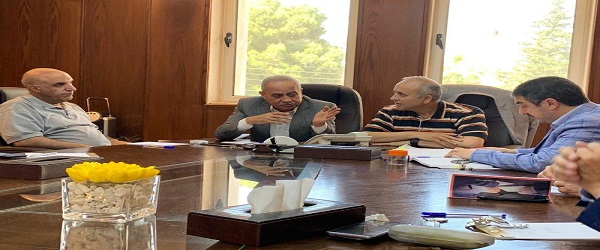20-May-2019

Abu Ali: Reducing the "milk production inputs" leads
to lower costs and allow tax deduction
The Jordan and Amman
Chambers of Industry valued the government's decision to abolish preferential
treatment for imported goods, citing recent tax measures to protect the
Jordanian industrial sector.
The meeting was
attended by the head of the Jordanian and
Amman Chambers of Industry Fathi
al-Jaghbir, attended by a number of industrialists and dairy producers and
members of the Amman Chamber of Industry on Saturday.
The Director General of
Income and Sales Tax Department Hassam Abu Ali said that the government has taken several decisions in favour of the
industrial sector and protect the national product and local industry and
support through the decision of the Council of Ministers, which abolished the
preferential treatment of imported goods at the expense of locally manufactured
goods and stop the postponement of tax on goods imported from abroad, In
promoting the demand for locally manufactured goods.
Abu Ali stressed that
the treatment of the tax distortion on the output inputs and the final output! Will serve the
industrialists of Jordan and meet their demands.
In response to a query
on the expected impact of the tax cut on milk production inputs, Abu Ali said
that reducing the tax on milk production inputs and imposing a 4 percent tax
would reduce the production costs in the sector, in addition to allowing tax
deductions to be paid.
For his part, Eng.
Al-Jaghbir stressed the importance of the decision of the Council of Ministers
regarding the abolition of the preferential treatment of imported goods and the
adoption of a number of resolutions and procedures that promote the national
industry and serve the members of the chambers of industry of Jordan and Amman
and the Jordanian consumer.
He praised the great
response shown by the Income and Sales Tax Department to the demands of the
members of the Jordan and Amman Chambers by studying these demands and solving
the problems facing them to serve the Jordanian industry.
Al-Jaghbir considered
that the decision of the Council of Ministers to reduce the tax on industrial
production inputs in addition to addressing the imbalance in the tax rates on
the inputs of the national industry and its outputs is a step in the right
direction.
He added that this
decision comes on the basis of intensive follow-up from the Amman and Jordan
chambers of commerce, the efforts of the Ministry of Industry, Trade and
Supply, the Customs Department and the Income and Sales Tax Department, which
resulted in the issuance of this decision, which is in the interest of the
national economy.
He pointed out that the
decision to ensure that the postponement of the payment of sales tax on imports
from production inputs that have a substitute for local industries, as well as
addressing the imbalance in taxes between the tax rates on the inputs of
national industry and output, in addition to reducing the tax on inputs of milk
production of boxes and cans and cages of 16 percent to 10 percent, calling for
reconsideration of the special clause in this resolution, which includes
subjecting milk and fresh milk to a 4 percent tax rate instead of exemption for
all sizes of packages.
With regard to oils,
the government's decision to reduce the tax on bottles and bottles used to fill
oils from a tax rate of 16 percent to a tax rate of 4 percent.
The fertilizer and
pesticide industry has reduced the tax on fertilizer and pesticide production
inputs, which are 16 percent to zero, since fertilizer and sales are zero.
He stressed that the
decision should include all production inputs that exceed the tax imposed on
them imposed on the final output, such as food containers, which are subject to
a tax rate of 4 percent, while the inputs of production of metal cans to 16
percent.
Al-Jaghbair stressed
that the decision refers to the government's recognition of the importance of
supporting the competitiveness of the national industry in the local market and
export markets, as well as recognition of the important role it plays in
supporting the national economy and the employment of Jordanian labor. He
praised the directives of Prime Minister Dr. Omar Al- Tax deferral of imported
goods that have a similar local alternative to quality and price, similar to
the study of production inputs.
"The decision also
confirms the government's efforts to support the national industry, especially
in light of the current conditions experienced by the Jordanian industry and
the decline of national exports to a number of traditional markets, and the
consequent heavy losses suffered by the industrial sector.
The representatives of
the industrial sectors expressed their appreciation for the measures taken by
the Government towards the industrial sector to benefit and benefit consumers.
It was agreed during
the meeting to hold periodic meetings to discuss matters of interest to the
industrial sector in the field of income tax and sales.
×
![]()